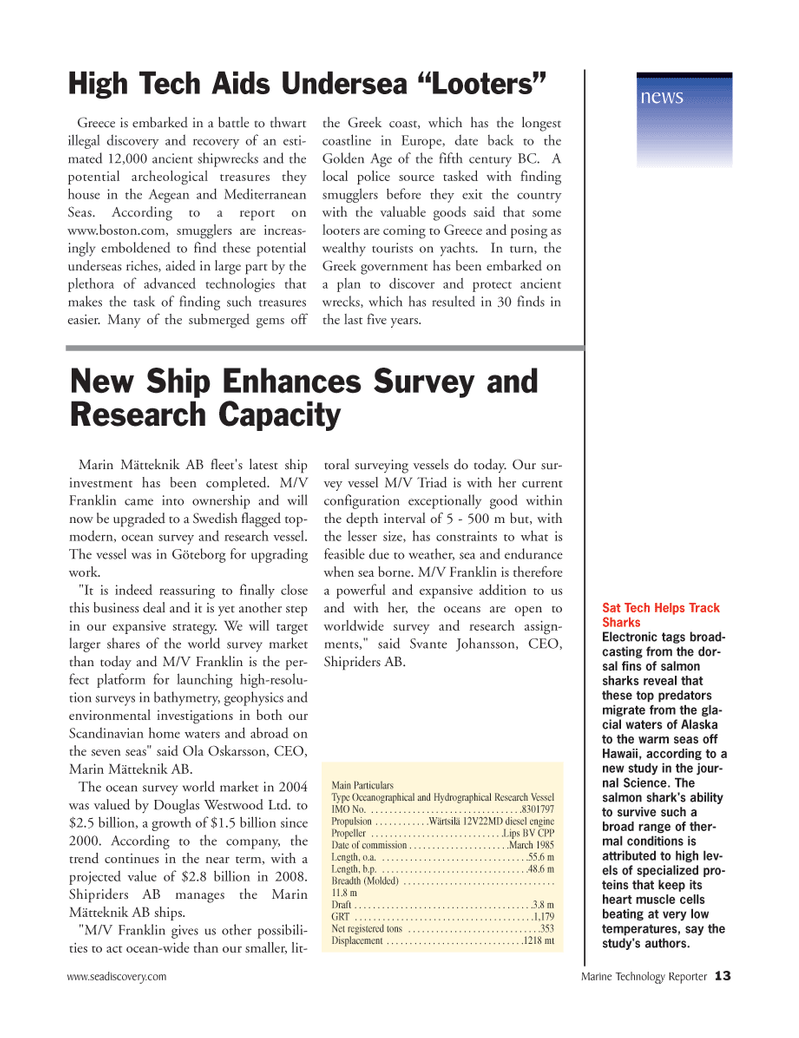
Page 13: of Marine Technology Magazine (November 2005)
Seafloor Engineering
Read this page in Pdf, Flash or Html5 edition of November 2005 Marine Technology Magazine
www.seadiscovery.com Marine Technology Reporter 13
Marin Mätteknik AB fleet's latest ship investment has been completed. M/V
Franklin came into ownership and will now be upgraded to a Swedish flagged top- modern, ocean survey and research vessel.
The vessel was in Göteborg for upgrading work. "It is indeed reassuring to finally close this business deal and it is yet another step in our expansive strategy. We will target larger shares of the world survey market than today and M/V Franklin is the per- fect platform for launching high-resolu- tion surveys in bathymetry, geophysics and environmental investigations in both our
Scandinavian home waters and abroad on the seven seas" said Ola Oskarsson, CEO,
Marin Mätteknik AB.
The ocean survey world market in 2004 was valued by Douglas Westwood Ltd. to $2.5 billion, a growth of $1.5 billion since 2000. According to the company, the trend continues in the near term, with a projected value of $2.8 billion in 2008.
Shipriders AB manages the Marin
Mätteknik AB ships. "M/V Franklin gives us other possibili- ties to act ocean-wide than our smaller, lit- toral surveying vessels do today. Our sur- vey vessel M/V Triad is with her current configuration exceptionally good within the depth interval of 5 - 500 m but, with the lesser size, has constraints to what is feasible due to weather, sea and endurance when sea borne. M/V Franklin is therefore a powerful and expansive addition to us and with her, the oceans are open to worldwide survey and research assign- ments," said Svante Johansson, CEO,
Shipriders AB.
Main Particulars
Type Oceanographical and Hydrographical Research Vessel
IMO No. . . . . . . . . . . . . . . . . . . . . . . . . . . . . . . . . .8301797
Propulsion . . . . . . . . . . . .Wärtsilä 12V22MD diesel engine
Propeller . . . . . . . . . . . . . . . . . . . . . . . . . . . . .Lips BV CPP
Date of commission . . . . . . . . . . . . . . . . . . . . . .March 1985
Length, o.a. . . . . . . . . . . . . . . . . . . . . . . . . . . . . . . . .55.6 m
Length, b.p. . . . . . . . . . . . . . . . . . . . . . . . . . . . . . . . .48.6 m
Breadth (Molded) . . . . . . . . . . . . . . . . . . . . . . . . . . . . . . . . . 11.8 m
Draft . . . . . . . . . . . . . . . . . . . . . . . . . . . . . . . . . . . . . . .3.8 m
GRT . . . . . . . . . . . . . . . . . . . . . . . . . . . . . . . . . . . . . . .1,179
Net registered tons . . . . . . . . . . . . . . . . . . . . . . . . . . . . .353
Displacement . . . . . . . . . . . . . . . . . . . . . . . . . . . . . .1218 mt
Greece is embarked in a battle to thwart illegal discovery and recovery of an esti- mated 12,000 ancient shipwrecks and the potential archeological treasures they house in the Aegean and Mediterranean
Seas. According to a report on www.boston.com, smugglers are increas- ingly emboldened to find these potential underseas riches, aided in large part by the plethora of advanced technologies that makes the task of finding such treasures easier. Many of the submerged gems off the Greek coast, which has the longest coastline in Europe, date back to the
Golden Age of the fifth century BC. A local police source tasked with finding smugglers before they exit the country with the valuable goods said that some looters are coming to Greece and posing as wealthy tourists on yachts. In turn, the
Greek government has been embarked on a plan to discover and protect ancient wrecks, which has resulted in 30 finds in the last five years.
High Tech Aids Undersea “Looters” news
New Ship Enhances Survey and
Research Capacity
Sat Tech Helps Track
Sharks
Electronic tags broad- casting from the dor- sal fins of salmon sharks reveal that these top predators migrate from the gla- cial waters of Alaska to the warm seas off
Hawaii, according to a new study in the jour- nal Science. The salmon shark's ability to survive such a broad range of ther- mal conditions is attributed to high lev- els of specialized pro- teins that keep its heart muscle cells beating at very low temperatures, say the study's authors.
MTR#3 (1-16).qxd 11/15/2005 2:14 PM Page 15

 12
12

 14
14
